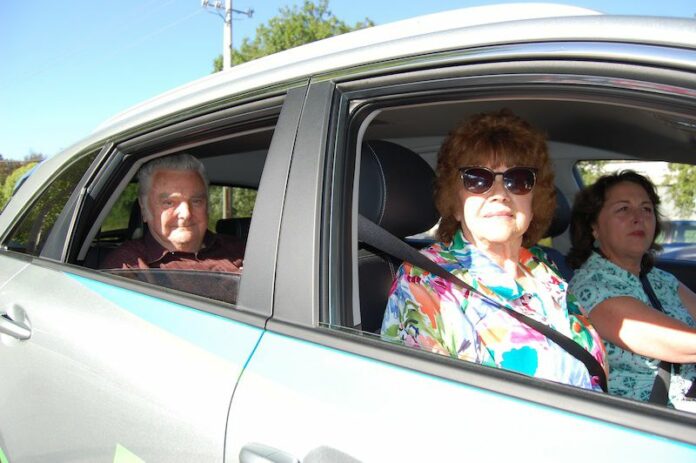
The Healdsburg City Council went over a slew of items before it breaks for the month of July.
Council was updated on its budget for fiscal years 2018-20, passing a resolution to amend the current fiscal year 4-0. Mayor David Hagele was absent.
Administrative Services Director Heather Ippoliti gave the presentation. She reported that the city is expected to bring in 103% of the budget by year’s end based on current revenues.
Sales tax, the main revenue generator for the city, is projected to be healthy, estimated to close at $5.13 million, 108% of the budget. Revenue to date is at $3.8 million, a 5% rise over 2017-18 numbers.
The transient occupancy tax (TOT) charged to those staying in lodging overnight saw a 20% increase over last year, though that is 12% lower than the projected rise that accounted for new development. Ippoliti said she is not requesting to amend the budget to account for this, wanting to see how it plays out. City Manager David Mickaelian said that he talked with hoteliers about the shortfall and they told him fires last year and the flooding in February were large factors in people avoiding staying in the area.
One item Ippoliti pointed out in the city’s revenue was the transfer tax, which is a tax on the changing of ownership of things like real estate. The tax is expected to bring in 74% of the budget, the lowest number since fiscal year 2014-15. Though she said she looked at it several different ways with staff, she did not find a trend to the fluctuation.
Expenditures totaled $11.05 million for fiscal year 2018-19 as of April 30, the most recent numbers available. This amounts to 84% of the budget collected so far.
One cost that had Ippoliti concerned was the city attorney costs, which are already at 92% of the budget through April 30. This is a 16% jump over last year.
City Attorney Samantha Zutler said there were a few litigation cases that were unexpected and a bond issue that increased this total, and added that council’s proactive behavior has also led to the rise as well, as a large number of ordinances are passed for a town this size.
“This city moves,” she said. “You do a lot. Quickly.”
The general fund sits at $8.37 million. This includes a reserve policy fund of $4.16 million and a pension stabilization fund at $3.93 million. The city is projecting that the pension fund in addition to other payments made to CalPERS — the state’s public pension system — will have the city back to a near fully funded liability in the early 2030s.
Mickaelian noted the importance of Measure V being renewed in order to keep fiscal health moving forward. Measure V tax money helps cover positions and equipment for first responders as well as other city priorities and amounts to $2 million a year.
Goal tending
The city also went over its revised goals through 2020, passing it 4-0.
Main changes included looking into alternative funding for housing, such as the TOT tax; adjusting the Land Use Code to promote economic diversity and diversifying transportation options.
Councilmember Joe Naujokas asked if there was something that could be done to add specifics to these goals. The public echoed this sentiment during public comment, as two came up to the dais to say they wanted more quantifiable metrics and timetable attached to each goal.
Councilmember Shaun McCaffery disagreed, saying that the word choice in the goals properly reflected the attitude of the current council.
“We are vague, until we’re not,” he said, adding that he was confident the drive of the council to find solutions would naturally add specifics as time went on.
Moving on
Council gave direction to staff in creating a permanent ordinance to provide relocation assistance to renters who are evicted through no fault of their own.
The city is currently operating under an urgency ordinance, which has been in place since March 4.
Currently, the ordinance is not tied to the income of the renter, which is likely to change. Present council agreed that up to 100% to 120% of area median income (AMI) would be a reasonable threshold for those qualifying, which for a family of four equates to $93,300 to $111,950 per year. Council agreed to wait for Hagele to return to provide input before settling on one number or the other.
Those who qualify will be paid up to $7,000 to help find a new place to live. This number is based on the area’s average cost for first and last month’s rent plus a security deposit of one month, figured using the U.S. Department of Housing and Urban Development numbers. On the low end for an efficiency unit, this would be $3,762.
Council also found consensus to have staff look at having this apply to all renters, not just those in multi-family units like apartment complexes.
A draft of the ordinance should appear in August with these changes in mind.
Geared up
A new program has wheels on the ground in Healdsburg — the DASH program. Two electric vehicles were purchased by the city to be used for helping seniors get around.
Volunteer drivers will provide a door-to-door service, helping seniors get into and out of the car and to their location.
Those interested in using the service must request a car five days in advance and it is based on availability. Those who volunteer must fill out an application, be fingerprinted and pass a background test.
To learn more about the program, visit the city website or call 707-431-3159.








